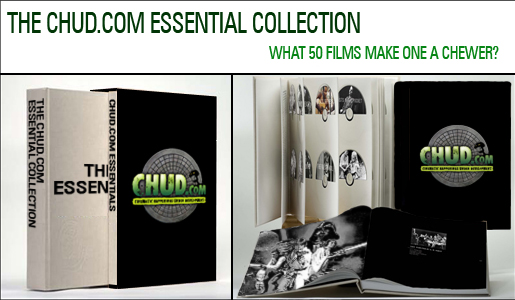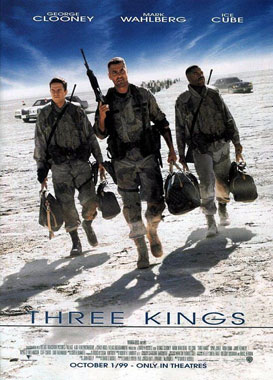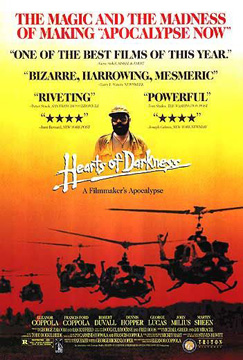
makes one a Chewer? It isn’t just reading CHUD.com regularly, although
that’s a great start. It definitely isn’t being an expert at
mastication. Being a Chewer requires a certain sensibility that’s
outside of the mainstream. Sure, a Chewer can hold his or her own in a Star Wars
OT vs PT argument with a standard movie geek, and sure, a Chewer can go
with the rest of the film snobs to an Ozu revival, but a Chewer also
gets really, really excited about the DVD release of The Manitou.
Over
the next few weeks we’re going to be bringing you The CHUD.com
Essential Films Collection – the films that would be in our dream
Chewer DVD Box Set. These are 50 movies that we think every Chewer
should see and love. This is by no means the definitive list of movies
that make one a Chewer, but it’s a good start. It’s also in no order –
the first films that we list are just as essential as the last ones.
And it’s a list that will leave off the obvious as much as possible –
you don’t need us to tell you to see Lawrence of Arabia or Seven
Samurai.
So
fire up your Netflix or your Amazon accounts – every day we’ll be
bringing you two movies that are worth seeing, and probably worth
owning as well. Chew on, Chewers.
Three Kings (Buy it from CHUD!)
 The Movie: Army officers Barlow,
The Movie: Army officers Barlow, as the first Gulf War winds down and Iraqi army officers are
surrendering under a cease fire agreement. Barlow stumbles upon a map
that ultimately leads the three to a huge load of Iraqi gold that was
stolen from Kuwait.
As they try to extract the small fortune for their own gain, they run
into a series of conflicts, both physical (rogue Iraqi soldiers) and
moral (Iraqi refugees who desperately need their help to leave the
country).
Why it’s Essential:David O. Russell’s movie is ostensibly a heist film, and a good one at that, but it’s also a sobering indictment of America
that resonates even more now that we’re repeating and compounding the
same mistakes of ignorance we made in the first Gulf War. The Iraq
of this film hasn’t merely been waylaid by American arms, but also by
American culture and capitalism, and as our protagonists bribe their
way through many of their problems, you can see that the rot of
corruption has taken hold of both countries. Now, there’s no divide
between us that money can’t paper over.
Another
marvel of the film is the fact that it features damn good performances
from two names not exactly known for powerhouse acting: Ice Cube and
auteur Spike Jonze. Cube goes beyond coasting on his scowl and presence
and truly gives some heart to the oddly religiousElgin.
Meanwhile, Jonze’ Conrad Vig is absolutely charming, even as an
ignorant, redneck stumbler who does his best to keep up with the
soldiers but can’t quite make it. The true star performance here,
though, is Wahlberg, who embodies many of the film’s underlying themes
in the character of Barlow, and pretty much has the most thrilling and
electrifying scenes all to himself.
This
is just a special little gem of a flick. It never made that big a
splash, but it ranks among the best work that any of the leads or
Russell has ever done, and when George Clooney is an afterthought to
everything else that’s great in your film, you’ve done something right,
damnit.
 The Movie:Having
The Movie:Havingmade two of the biggest films in history, Francis Ford Coppola is on
location in the Philippines with what amounts to a blank check and an
open schedule. All he wants to do is make his movie, but he doesn’t
know exactly what Apocalypse Now is going to be, nor exactly how to go
about it. The film turns out to be a beast with a will and heart of its
own. Before he completes the film, Coppola will face his own indecision
and creative roadblocks, military conflicts, natural disasters and all
the physical and mental breakdowns that characterized the war he’s
attempting to depict.
Why it’s Essential: Most movies about movies are full of shit. The same thing has been said of Apocalypse Now.
But this documentary is the real deal, as harrowing and intimately
dangerous as Coppola’s war movie.* The footage captured by Eleanor
Coppola and assembled by Fax Bahr and George Hickenlooper is just as
remarkable as the actual film. Watching Apocalypse,
audiences might never know that the opening song ‘The End’ could easily
refer to Coppola’s atristic indepencence, marriage and financial
security.
Some of the small moments in Hearts
have almost become movie clich’s in their own right – I’m thinking of
Brando’s “I swallowed a bug” take. But there’s nothing common about the
big, sweeping strokes with which Coppola is attempting to tell his
story or the counter-strokes that tried to end it at every turn. You’ll
never see anything in filmmaking like watching a typhoon destry the
massive sets Coppola paid for with his Godfather
profits and other bank loans, or realizing that his fleet of
helicopters could peel off in the middle of a take to go fight an
actual civil war. Brando’s diva behavior and Martin Sheen’s alcoholism
and infirmity make the situation that much worse.
Not only does the movie depict as accurately as a possible the making of Apocalypse,
it documents a Hollywood that existed for only a brief moment. It’s
almost impossible now to understand any filmmaker being out in the
field with so much money and leeway. Thanks to movies like Coppola’s
and Heaven’s Gate, that’s
something that will probably never happen again. Many of us now
continue to draw inspiration from the brief blip where Hollywood was
almost a different business machine, and nothing shows that alternate
reality better than this film.
*Since Hearts of Darkness isn’t commonly available, I’ll mention that the closest second is Burden of Dreams, which features Klaus Kinski and Werner Herzog during the making of Fitzcarraldo.